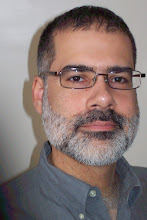Taijiquan is very similar, I thought this morning as I was walking back from practice. In the practice of the form, it's very easy to feel a feeling of stolidity, of being a mountain. However, once you enter into the realm of pushing hands, you find that this relaxed feeling of being a mountain gets you pushed all over the place. In essence, there is no fixed place, no center.
One push-hands partner of mine at our Sunday Meetup group would start to roll-back as I began my push towards her, but then sink into a horse stance. She had a karate background, so it was a natural response, but I realized that she was sinking into more than just a physical stance. She was sinking into a feeling of stolidity, retreating to an idea of groundedness. She wanted to feel immovable, to feel safe.
Buddhism and taiji are the same in that they offer no sure havens. In Buddhism, you get rocked on your cushion as you sit with all your ideas; dashed hopes, dreams that didn't fructify, all sorts of ideas about yourself. In push-hands, you learn that resisting the forces on you only make them all the more powerful, that you cannot always stand against the outside. In both instances, you have to yield. On the cushion, you yield to the idea and let it pass unhindered, and in taiji you yield to the push and let it move you.
The Art of War states that, "...if the enemy is quietly encamped, he can be forced to move." Therefore, the idea of stability in itself carries within it the seed of instability. Falling back like my partner onto something that feels always stable has within it the potential to be moved.
The Buddhist and the taiji practitioner first try to accord his or herself with the idea of being moved. No one likes it, but it's inevitable, and one may as well get comfortable with the idea. After long practice, and acceptance of being moved, one is moved less and less. Finally, one day, it appears to the outside observer that the practitioner cannot be moved at all. They still can, of course, but they move along with "it" so well that it appears as if they are unmoved, as if they are unperturbed.
Sink first into this leg, than that one. Let this idea arise, and then watch it fall. Hold the center, and move along with it. Therein is liberation.
